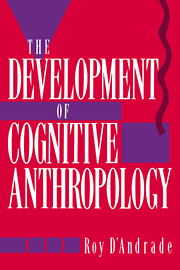Book contents
- Frontmatter
- Contents
- List of figures
- List of tables
- Preface
- 1 Background
- 2 Towards an analysis of meaning
- 3 The classic feature model
- 4 Extension of the feature model
- 5 Folk taxonomies
- 6 The growth of schema theory
- 7 Models and theories
- 8 Cultural representations and psychological processes
- 9 Cognitive processes and personality
- 10 Summing up
- References
- Name index
- General index
- Frontmatter
- Contents
- List of figures
- List of tables
- Preface
- 1 Background
- 2 Towards an analysis of meaning
- 3 The classic feature model
- 4 Extension of the feature model
- 5 Folk taxonomies
- 6 The growth of schema theory
- 7 Models and theories
- 8 Cultural representations and psychological processes
- 9 Cognitive processes and personality
- 10 Summing up
- References
- Name index
- General index
Summary
At the time the feature model of kinship was being developed, detailed field studies of folk biology were also being investigated by a number of anthropologists. One of the earliest systematic investigations of folk botanical knowledge – a field of study called “ethnobotany” – was carried out by Harold Conklin among the Hanunóo, a horticultural people of the Philippines (1954). He found Hanunóo ethnobotany to be an incredibly rich lexical domain, containing more than 1,800 specific plant terms. Conklin and later ethnobiologists focused much of their research effort on plant and animal terminological systems, and especially the taxonomic groupings of plants and animals.
There were good reasons for placing the primary emphasis on taxonomy rather than features in the study of folk knowledge of biology. The taxonomic relation, x is a kind of y, is one of the major ways in which people organize knowledge about plants and animals. It is not that features of plants and animals are irrelevant – Hanunóo or Tzeltal informants can talk at length about the features of particular specimens, and have rich vocabularies with which to do so.
- Type
- Chapter
- Information
- The Development of Cognitive Anthropology , pp. 92 - 121Publisher: Cambridge University PressPrint publication year: 1995



